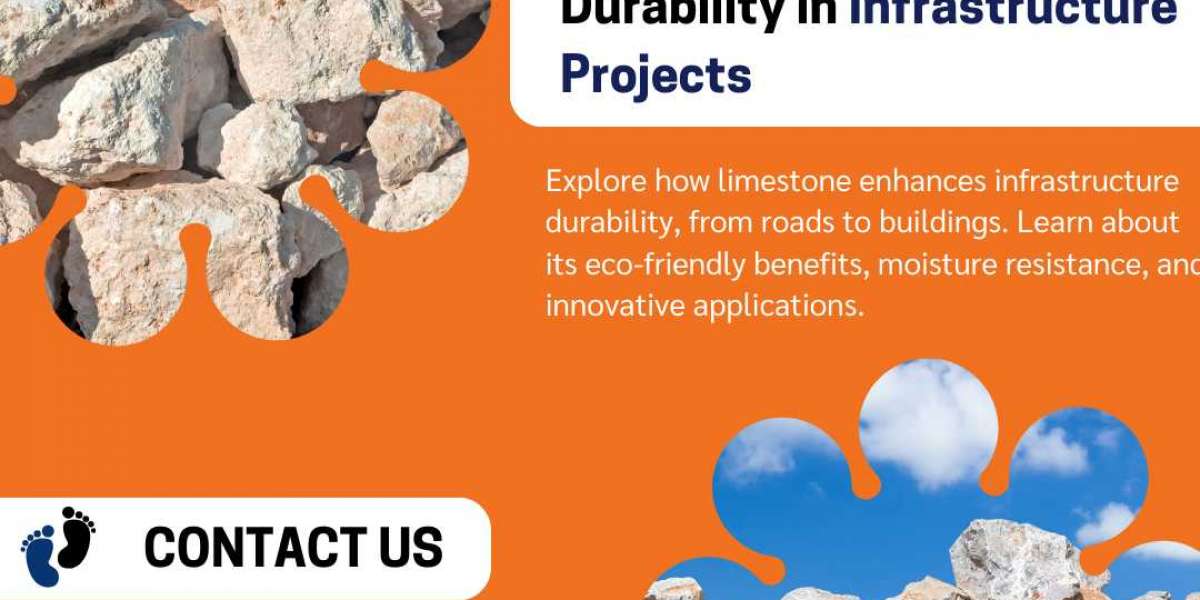Since ancient times, limestone has been used as a building material because of its unique properties. These properties enhance durability and sustainability. Its adaptability, affordability and versatility make it an essential component for roads, buildings and bridges. Modern engineering requires materials that are strong, but also eco-friendly. Limestone continues to be a major player in infrastructure projects.
The Role of Limestone in Reinforcing Structural Foundations
The structural foundations form the basis of all infrastructure projects. The high compressive strength of limestone and its ability to bond with other materials makes it an ideal material for reinforcing foundations. As aggregate, limestone increases the density of concrete and reduces cracking.
Hydrated lime is a derivative from limestone that has a high level of effectiveness in stabilizing soil. Engineers can increase the soil's load-bearing capability by mixing it with hydrated lime. This makes it ideal for stable foundations. Working with hydrated lime manufacturers in India, will ensure that you have access to high quality lime products.
Limestone as a Key Component in Road Construction
Materials that are able to withstand high traffic and changing weather conditions are essential for road infrastructure. Due to its excellent adhesion properties and resistance against erosion, limestone is the preferred material for road bases and subbases.
Asphalt mixes often include quick lime, a derivative of limestone. This improves pavement durability. It reacts to water and other materials, creating a solid surface that is impermeable and prevents potholes and cracking. Partnering with leading manufacturers of quick lime in India will ensure a consistent supply and high quality for projects that need quick and efficient solutions.
How Limestone Improves the Lifespan of Concrete Structures
Limestone is a filler or aggregate that strengthens concrete, reduces shrinkage and improves its resistance to weathering. As a filler, or aggregate, limestone strengthens concrete and reduces shrinkage. It also improves the resistance of the material to weathering.
The addition of limestone powder to concrete mixes also improves its workability. This makes it easier to shape and mold during construction. The alkaline nature of limestone prevents steel reinforcement from corroding. This extends the life span of concrete structures.
The Moisture Resistance of Limestone in Infrastructure Applications
Resistant to moisture is one of the most important factors for infrastructure durability. Natural impermeable limestone is an excellent material to prevent water from entering roads, walls and foundations.
Limestone, when used as a barrier in lime wash or lime plaster, keeps moisture away while still allowing the structure to "breathe." This double property keeps surfaces and walls free of mold and moisture, and preserves their integrity over decades. Trusted lime suppliers in Jodhpur provide premium lime products to meet diverse construction needs. These products are moisture resistant.
Eco-Friendly Benefits of Limestone in Sustainable Infrastructure
In a world that is increasingly embracing sustainability, limestone has become a more eco-friendly option to the traditional building materials. Its production is less energy-intensive than other materials, such as cement. This results in a smaller carbon footprint.
Limestone-based products, such as limecrete and lime mortar, are recyclable and biodegradable. They also reduce construction waste. Limestone's ability over time to absorb carbon dioxide makes it an excellent resource for carbon neutral projects. These characteristics are in line with global efforts to promote sustainable infrastructure development.
Limestone's Impact on Thermal Insulation in Buildings
The need for energy efficiency in construction is growing, and the use of limestone can significantly improve thermal insulation. The temperature of structures made from limestone is better regulated, which reduces the need for artificial cooling or heating.
Plasters and mortars based on lime not only improve indoor air quality, but also provide insulation by neutralizing toxins and absorbing moisture. This makes limestone a great material to use in energy-efficient constructions that improve occupant comfort while lowering energy costs.
Innovations in Limestone Usage for Modern Infrastructure Projects
The advancement of technology has opened up new possibilities in the use of limestone for construction. Self-healing cement, which is made from bacteria that produce limestone, has revolutionized the way infrastructure projects are constructed and maintained.
Another area where limestone has made waves is 3D printing. Limestone powder can be used to print custom-made building components. This reduces waste and speeds up construction.
Collaboration with leading manufacturers allows access to innovative solutions for limestone tailored to modern construction requirements. India's infrastructure is a leader in the world, and utilizing limestone's potential to achieve durability and sustainability will be essential.
Conclusion
It is not just a building material, but a cornerstone for a durable, cost-effective, and sustainable infrastructure. Limestone has proven to be versatile in many applications, including reinforcing the foundations, improving road durability, moisture resistance and thermal insulation.
The construction industry can maximize the value of this resource by partnering with reputable manufacturers and suppliers, like hydrated limestone manufacturers in India or quick lime manufacturers in India,. Limestone continues to be a key component in building resilient infrastructures for future generations. Innovations are driving its use and sustainability is at its core.

